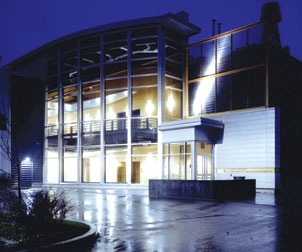McGowan Institute Gets $12 Million for Human Studies of Treatments for Battlefield Injuries, Scars
 A two-year, $12 million contract with the U.S. Department of Defense Office of Technology Transition (OTT) will jump-start human trials of three innovative research programs that aim to replace scars and defects with healthy, functional tissues, announced officials of the University of Pittsburgh and the Pitt-UPMC McGowan Institute for Regenerative Medicine.
A two-year, $12 million contract with the U.S. Department of Defense Office of Technology Transition (OTT) will jump-start human trials of three innovative research programs that aim to replace scars and defects with healthy, functional tissues, announced officials of the University of Pittsburgh and the Pitt-UPMC McGowan Institute for Regenerative Medicine.
According to Alan Russell, director of the McGowan Institute and leader of the new program, the OTT mission emphasizes the rapid translation of preclinical research into human studies to bring successful therapies more quickly to everyday practice.
“This initiative provides fiscal support and also represents a shared commitment to the goal of helping soldiers return to the lives they have put on the line for us,” Russell said. “All these projects could deliver much-needed solutions for the ills that plague our wounded warriors. They are designed to give back what has been lost or taken away: normal tissues that function properly, adapting to our changing biological environment to keep us healthy and whole.”
In particular, the OTT initiative will focus on efforts to:
• Replace muscle tissue through extracellular matrix, a protein- and growth-factor-rich biological “scaffold” that appears to recruit stem cells and other precursors to injury sites. Primary investigators are Stephen Badylak, a research professor in the Pitt School of Medicine’s Department of Surgery and director of tissue engineering at the McGowan Institute, and J. Peter Rubin, a Pitt professor of plastic surgery in the School of Medicine;
• Bring to clinical testing an injectable porous bone cement for the repair of craniofacial bone defects and restoration of normal bone growth and remodeling. Primary investigators are Bernard J. Costello, a professor and residency program director in the Pitt Department of Oral and Maxillofacial Surgery and chief surgeon with the Cleft and Craniofacial Center in Pitt’s School of Dental Medicine; Prashant N. Kumta, the Edward R. Weidlein Chair in Pitt’s Swanson School of Engineering and a professor in the Departments of Bioengineering, Chemical and Petroleum Engineering, and Mechanical Engineering and Materials Science; and Charles Sfeir, a professor in the School of Dental Medicine’s Department of Oral Medicine and Pathology; and
• Evaluate the injection of human fibroblasts, a type of connective tissue cell, into contracted burn scars to soften the skin and allow greater freedom of movement. Primary investigators are J. Peter Rubin, a professor in the Pitt School of Medicine, and Paul Kemp, founder, chief scientific officer, and executive director of the company Intercytex, a UK-based developer of regenerative medicine products with laboratories in the UK and in Boston.
Battlefield mortality has decreased from 30 percent in World War II to less than 10 percent in the conflicts of the present day, partly because of advances in medicine, surgery, and trauma care. Still, today’s injured soldiers are returning home with twice the rate of life-changing wounds, including finger and limb amputations, of World War II’s returning injured solders.
The OTT Initiative is funded by the Joint Improvised Explosive Device Defeat Organization (JIEDDO). The projects, if successful, could ultimately lead to interventions that also benefit civilians, noted Arthur S. Levine, senior vice chancellor for the health sciences and dean of the School of Medicine at Pitt.
“Muscle loss, bone damage, and severe scarring that restrict natural movement are not uncommon consequences of traumatic accidents or surgeries that require a large amount of tissue removal,” Levine said. “We must find more ways to help individuals who are struggling with the aftermath of these potentially devastating problems.”
Other Stories From This Issue
On the Freedom Road

Follow a group of Pitt students on the Returning to the Roots of Civil Rights bus tour, a nine-day, 2,300-mile journey crisscrossing five states.
Day 1: The Awakening
Day 2: Deep Impressions
Day 3: Music, Montgomery, and More
Day 4: Looking Back, Looking Forward
Day 5: Learning to Remember
Day 6: The Mountaintop
Day 7: Slavery and Beyond
Day 8: Lessons to Bring Home
Day 9: Final Lessons

